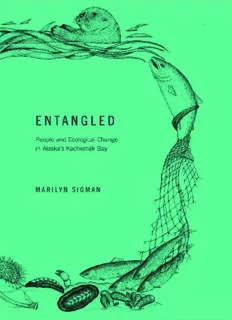
Entangled: People and Ecological Change in Alaska’s Kachemak Bay PDF
Preview Entangled: People and Ecological Change in Alaska’s Kachemak Bay
Entangled is a profound meditation on how the inhabitants of Kachemak Bay—human and nonhuman alike—have reckoned with the ebb and surge of cultural and ecological changes through time. With the curi- osity of a biologist, the doggedness of a detective, and the eloquence of a poet, Marilyn Sigman beautifully deciphers a landscape marked by abundance and scarcity, stability and disruption, loss and resilience, memory and story. The fascinating result is a scientific whodunit, a natural and cultural history, a deep map, an elegy, and, above all, a love letter. —Sherry Simpson, author of Dominion of Bears, winner of the 2015 John Burroughs Medal for Distinguished Natural History Book Marilyn Sigman unites her “science brain” with her naturalist’s heart and an insatiable curiosity to bring us a beautifully written account of human and ecological connections. Part memoir, part natural history, part quest into understanding the nature of change—Entangled will delight not just readers intrigued with Alaska’s resource and cultural history but all those concerned with what it means to know and honor a home place. —Nancy Lord, former Alaska Writer Laureate, author of Fishcamp and Beluga Days Like creatures in an ephemeral tide pool, our lives are shaped by forces both within and beyond our control. In Entangled, Marilyn Sigman shows us that life is messy, shift happens, and riding the waves of change is best done with a steady kayak, muck boots, and an inner compass. — Amy Gulick, photographer and author of Salmon in the Trees: Life in Alaska’s Tongass Rain Forest In these pages Marilyn Sigman sweeps us along a path of personal discovery. This memoir is steeped in fast-moving, wondrously descriptive stories centered on the biology and archeology of the Kachemak Bay region of Alaska within the context of her personal and family history. Whether it be the investigation of the sea otter and the bidarki’s role in shaping shoreline ecology, or the chain of environmental fallout precipitated by a recent ocean warming event (the “Blob”), or her telling of the spiritual and environmental story of the Kachemak people and their sudden mysterious disappearance, Sigman constructs a far-reaching picture of sometimes sudden historic and current environmental change. With great detail and the personal insight that comes from looking closely at the world around her, she draws us into the story behind the changes and their larger implications. Sigman has crafted a must-read for both local and visitor. —Craig Matkin, marine mammal scientist and director of the North Gulf Oceanographic Society E N T A N G L E D People and Ecological Change in Alaska’s Kachemak Bay “Raven’s-Eye View of Kachemak Bay,” by Mike Sirl. E N T A N G L E D People and Ecological Change in Alaska’s Kachemak Bay MARILYN SIGMAN Text © 2018 University of Alaska Press Published by University of Alaska Press P.O. Box 756240 Fairbanks, AK 99775-6240 Cover and interior design by 590 Design. Image credits: Part 1: “Bidarki” (aka katy chiton) by Conrad Field Part 2: “Kachemak lamp” by Kim McNett Part 3: “Halibut” by Conrad Field Part 4: “Otter carving” by Kim McNett Cover art by Conrad Field. Text by Weeden and Steinbeck printed with permission. Library of Congress Cataloging in Publication Data Names: Sigman, Marilyn, author. Title: Entangled : people and ecological change in Alaska’s Kachemak Bay / by Marilyn Sigman. Description: Fairbanks : University of Alaska Press, [2018] | Includes index. | Identifiers: LCCN 2017031753 (print) | LCCN 2017048212 (ebook) | ISBN 9781602233492 (ebook) | ISBN 9781602233485 (pbk. : alk. paper) Subjects: LCSH: Climatic changes | Alaska | Kachemak Bay Region. | Ecology | Alaska | Kachemak Bay Region. | Kachemak Bay (Alaska) Classification: LCC QC903.2.A37 (ebook) | LCC QC903.2.A37 S54 2018 (print) | DDC 577.27/6097983dc23 LC record available at https://lccn.loc.gov/2017031753 Dedicated to the memory of my father, Leo Sigman, who took me fishing All Alaskans must come to terms with the central problem of how a contemporary society can function harmoniously within arctic and subarctic environments. Harmonious function implies a deep and true knowledge of those environments and human interactions with them. —Robert B. Weeden, Messages from the Earth: Nature and Human Prospect in Alaska
Description: